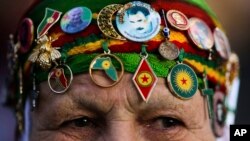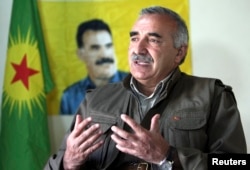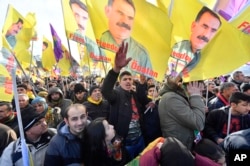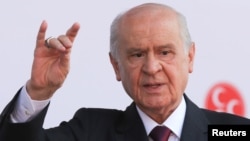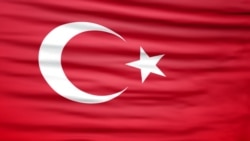A recent U.S. move against Kurdish militant leaders in Turkey could complicate prospects for peace between the Turkish government and the country’s Kurdish minority, activists and analysts said.
The U.S. on Tuesday offered cash rewards for information on three senior members of the Turkey-based Kurdistan Workers’ Party (PKK), which Turkey, the United States and the European Union consider a terrorist organization.
Washington offered rewards of up to $5 million for information “leading to the identification or location” of Murat Karayilan, up to $4 million for Cemil Bayik and up to $3 million for Duran Kalkan.
The three men have been influential figures in a three-decade insurgency against Turkish armed forces in Turkey’s Kurdish-majority southeast region.
Tuesday’s announcement was made by the U.S. Embassy in Ankara after a visit by U.S. Deputy Assistant Secretary of State Matthew Palmer.
The move could help ease strained ties between Washington and its NATO ally Ankara.
Relations between Turkey and the United States improved last month after Turkey released American pastor Andrew Brunson, who had been imprisoned for nearly two years. Both nations also lifted sanctions on government officials, imposed in August, over the pastor’s case.
But some political groups in Turkey said the recent U.S. move against PKK leaders would hurt chances for peace in Turkey.
“Offering cash rewards on the PKK leaders is a very clear support to the Turkish government military approach against the Kurds,” Giran Ozcan, the U.S. representative of the People’s Democratic Party (HDP), a pro-Kurdish group in Turkey, told VOA.
Peace process
In 2015, a two-year peace process between the Turkish government and the PKK collapsed. The two sides were holding talks intended to end the conflict that has killed thousands of people, mostly civilians in Turkey.
“The peace process was a brilliant opportunity to put an end to civilian deaths,” Ozcan said. “The U.S. was supportive of that process. So we call on the U.S. government to use its leverage to push the Turkish government to go back to the negotiating table with the PKK.”
But targeting these figures “makes life harder for the PKK in general because it is trying to legitimize itself [and] pushing hard to have itself delisted as a terror organization,” said Amberin Zaman, a Turkish columnist at the website Al-Monitor.
Zaman added that the recent development is going to seriously hurt the PKK.
“This is clearly a very big blow to them in that sense that they have been trying to present themselves as a legitimate political organization in the eyes of the world,” she said.
But Zaman said the government’s peace efforts would not be hurt by the U.S. move because Turkish President Recep Tayyip Erdogan had already taken a tougher approach toward the pro-Kurdish HDP.
“I think that the government of Recep Tayyip Erdogan has made a very clear decision to freeze the peace process, stoke up an alliance with the nationalists, with [Devlet] Bahceli [chairman of the Nationalist Movement Party, known as MHP], and it’s showing no signs of shifting that course,” she added.
While some Kurdish activists downplayed the significance of the PKK leaders’ designation, others like Hosheng Ose, a Brussels-based Kurdish affairs analyst, believe the designation marks a significant development on the U.S. part.
“This is not a symbolic move to appease Turkey,” Ose said. “The U.S. means business when it puts money from its own budget to find these PKK leaders. This is a serious matter.”
Ose added that the U.S. objective in the long run is to disarm the PKK “in what could be seen as a new attempt to help solve the Kurdish question in Turkey.”
Turkey’s guarded welcome
Turkish Defense Minister Hulusi Akar said the U.S. move was a positive but “very, very late” step, and called on Washington to adopt a similar policy toward the Syria-based People’s Protection Units (YPG).
“It is not possible for us to accept putting a bounty on PKK leaders on the one hand, and sending trucks of tools, weapons and ammunition to the YPG on the other,” Akar told the state-owned Anadolu news agency Wednesday.
Turkey has been angered by U.S. support for Syrian Kurdish forces in their fight against Islamic State (IS) militants.
The Turkish government views the YPG as an extension of the PKK and has carried out several attacks on their positions in Syria in recent weeks.
WATCH: Why Turkey Is Attacking YPG
“Our position on PKK is clear, but we do not classify YPG as a terror organization. We never did,” James Jeffery, the U.S. special envoy to Syria, told reporters during a teleconference Wednesday.
“We understand Turkey’s security concerns. We understand the concern over ties between PKK and YPG. That’s why we are acting very, very carefully. We inform Turkey about what we do and why we do it,” Jeffery added.
But Turkish officials insist that such measures will remain incomplete as long as the U.S. doesn’t sever ties with the Syrian YPG.
“Turkey’s main expectation from the U.S., which is our NATO ally and strategic partner, is to end all its engagements with YPG, the Syrian branch of the PKK terror group,” Turkish presidential spokesman Ibrahim Kalin said.
“It is a futile effort from the U.S. to describe the YPG, which they used to describe as the Syrian branch of the PKK, as a legitimate group which has no links with terrorism and the PKK,” he said Wednesday after an official cabinet meeting in Ankara.
VOA’s Ezel Sahinkaya contributed to this report from Washington.




